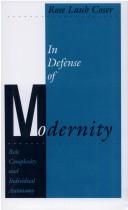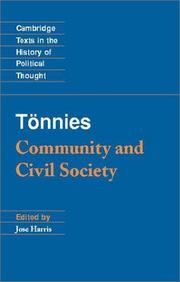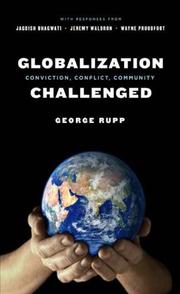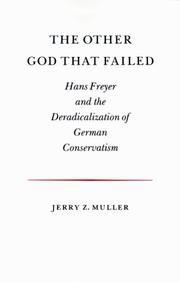| Listing 1 - 10 of 11 | << page >> |
Sort by
|
Book
Year: 1991 Publisher: London : Routledge and Kegan Paul,
Abstract | Keywords | Export | Availability | Bookmark
 Loading...
Loading...Choose an application
- Reference Manager
- EndNote
- RefWorks (Direct export to RefWorks)
Book
ISBN: 3518291866 Year: 2002 Publisher: Frankfurt am Main Suhrkamp
Abstract | Keywords | Export | Availability | Bookmark
 Loading...
Loading...Choose an application
- Reference Manager
- EndNote
- RefWorks (Direct export to RefWorks)
Book
ISBN: 9783643901385 3643901380 Year: 2013 Publisher: Zurich: Lit,
Abstract | Keywords | Export | Availability | Bookmark
 Loading...
Loading...Choose an application
- Reference Manager
- EndNote
- RefWorks (Direct export to RefWorks)

ISBN: 0804718717 Year: 1991 Publisher: Stanford (Calif.) : Stanford university press,
Abstract | Keywords | Export | Availability | Bookmark
 Loading...
Loading...Choose an application
- Reference Manager
- EndNote
- RefWorks (Direct export to RefWorks)
Book
ISBN: 9782753510296 2753510296 Year: 2015 Publisher: Rennes: Presses universitaires de Rennes,
Abstract | Keywords | Export | Availability | Bookmark
 Loading...
Loading...Choose an application
- Reference Manager
- EndNote
- RefWorks (Direct export to RefWorks)
Communities --- Group identity --- Communauté --- Identité collective --- Gemeinschaft and Gesellschaft (Sociology) --- Social groups --- Social interaction --- Gemeinschaft et Gesellschaft (Sociologie) --- Groupes sociaux --- Interaction sociale --- Communauté

ISBN: 1107113164 1280429089 9786610429080 051181626X 051117375X 0511039670 0511152981 0511303319 0511053487 9780511039676 0521561191 9780521561198 0521567823 9780521567824 9780511152986 9780511816260 9781107113169 9781280429088 6610429081 9780511303319 9780511053481 Year: 2001 Publisher: Cambridge New York Cambridge University Press
Abstract | Keywords | Export | Availability | Bookmark
 Loading...
Loading...Choose an application
- Reference Manager
- EndNote
- RefWorks (Direct export to RefWorks)
Ferdinand Tönnies' Gemeinschaft und Gesellschaft (first published in 1887) is a classic of social and political theory, which explores the clash between small-scale neighbourhood-based 'communities' and large-scale competitive market 'societies'. Tönnies considers all aspects of life - political, economic, legal and family; art, religion and culture; the construction of 'selfhood' and 'personhood'; and modes of cognition, language and understanding. Often recognised as one of the founding texts of sociology, Gemeinschaft und Gesellschaft is also a highly significant contribution to European political thought and philosophy, with particular relevance to the legacies of Hobbes and Kant. It is at once a response to modernity, a theoretical exercise in social, political and moral science, and an unusual commentary on the inner character of 'democratic socialism'. This new English rendition will introduce Tönnies' work to a fresh generation of English-speaking readers with interests in social and political theory and the history of European ideas.
Social structure. --- Gemeinschaft and Gesellschaft (Sociology) --- Community and association (Sociology) --- Community and society (Sociology) --- Gesellschaft and Gemeinschaft (Sociology) --- Sociology --- Organization, Social --- Social organization --- Anthropology --- Social institutions --- Social structure --- #A0103W --- Social Sciences --- Political Science
Book
ISBN: 0262374900 0262374897 026254590X 9780262545907 9780262374903 9780262374897 Year: 2023 Publisher: Cambridge, Massachusetts: The MIT Press,
Abstract | Keywords | Export | Availability | Bookmark
 Loading...
Loading...Choose an application
- Reference Manager
- EndNote
- RefWorks (Direct export to RefWorks)
Drone technology has garnered critical attention across many fields, from engineering to the humanities. While the first wave of drone scholarship was key in initiating the debate on drones, it also privileged the idea of the “scopic regime”—a militarized regime of hypervisuality—in its analyses of the connection between vision and power. The Sensorium of the Drone and Communities broadens the drone's spectrum of perception by acknowledging its creative, life-affirming possibility with the notion of the sensorium. The sensorium of the drone is a multimedia, synesthetic sensing assemblage in which the human agent is enmeshed with the drone. Drone sensoria can sense in many more ways than the scopic regime—with sound, touch, smell, temperature, and movement.In The Sensorium of the Drone and Communities, Kathrin Maurer shows how drone sensoria can change our understanding of human communities by constructing imaginaries of social communities based on decentralized and fluid sensing processes. Maurer takes an aesthetic approach to technology, working with two understandings of aesthetics. One understanding refers to aesthetics as a way of experiencing, and it explores how the drone-human assemblage perceives the world. The other refers to aesthetic mimetic representation, and focuses on how aesthetic drone imaginaries in literature, popular culture, visual arts, and films negotiate the sensorial technology of the drone.Bringing together key ideas in technology studies, studies of aerial views, visual and aesthetic studies, posthuman sensing, machine–human interaction, and communities, The Sensorium of the Drone and Communities sheds a welcome and necessary light on this technology's creative potential as well as its dangers and risks.
Drone aircraft --- Sociotechnical systems. --- Gemeinschaft and Gesellschaft (Sociology) --- Sensor networks. --- Electronic surveillance. --- Psychological aspects. --- Societies, etc. --- TECHNOLOGY & ENGINEERING / Social Aspects --- ART / Criticism & Theory --- SOCIAL SCIENCE / Media Studies --- Sociotechnical systems --- Sensor networks --- Electronic surveillance

ISBN: 0231139306 0231139314 9786613008121 1283008122 0231511353 9780231511353 9780231139304 9780231139311 9781283008129 Year: 2006 Publisher: New York Columbia University Press
Abstract | Keywords | Export | Availability | Bookmark
 Loading...
Loading...Choose an application
- Reference Manager
- EndNote
- RefWorks (Direct export to RefWorks)
In Globalization Challenged, George Rupp, president of the International Rescue Committee, outlines the steps necessary to engage the contemporary conflict between traditional religious belief and Western secularism. According to Rupp, the key objective is to build a community that is inclusive without denying the validity of particular commitments. While he acknowledges the threat of "resurgent fundamentalism," Rupp also criticizes secularists who fail to recognize or acknowledge the role of religion and its ideological equivalents in influencing public policy. All views, he asserts, are subject to comparative appraisal. The challenge is to develop ways to evaluate different approaches responsibly, leading to a greater understanding of one's own convictions as well as the positions of others.Rupp reinforces his critical and theoretical analysis with dramatic accounts of recent events in Afghanistan, the Democratic Republic of Congo, and Sudan-places where the International Rescue Committee operates. He then addresses the role of globalization in fueling instability worldwide. Inadequately regulated privatization has compromised health care, education, and social programs in many countries, whereas an inclusive community would encourage a more equitable distribution of resources.Essays by Jagdish Bhagwati, Jeremy Waldron, and Wayne Proudfoot expand Rupp's arguments, and in a final chapter Rupp responds to the issues they raise. Essential reading for anyone who hopes to understand the roots of today's geopolitical tensions, Globalization Challenged asks that we shed our complacency, recognize the legitimate role of conviction, and take actions to shape a more just and inclusive society.
Cultural pluralism. --- Globalization --- Social conflict. --- Communities. --- Gemeinschaft and Gesellschaft (Sociology) --- Social aspects. --- Religious aspects. --- Community and association (Sociology) --- Community and society (Sociology) --- Gesellschaft and Gemeinschaft (Sociology) --- Community --- Class conflict --- Class struggle --- Conflict, Social --- Social tensions --- Cultural diversity --- Diversity, Cultural --- Diversity, Religious --- Ethnic diversity --- Pluralism (Social sciences) --- Pluralism, Cultural --- Religious diversity --- Sociology --- Social groups --- Interpersonal conflict --- Social psychology --- Culture --- Cultural fusion --- Ethnicity --- Multiculturalism
Book
ISBN: 9033421356 Year: 1990 Volume: vol 2 Publisher: Leuven : Acco,
Abstract | Keywords | Export | Availability | Bookmark
 Loading...
Loading...Choose an application
- Reference Manager
- EndNote
- RefWorks (Direct export to RefWorks)
chijnt ook als : Tijdschrift voor Sociologie, 1989 (10), nr. 6
Gemeinschaft and Gesellschaft (Sociology). --- Hulpwetenschappen --- Social structure. --- Sociologie. --- Tönnies, Ferdinand. --- Sociology --- gemeenschap --- sociologie --- maatschappij --- Tönnies, Ferdinand --- 316.2 TOENNIES, FERDINAND --- Academic collection --- #SBIB:316.20H14 --- 316.2 --- 316 --- Sociologie --- 316.2 TOENNIES, FERDINAND Sociologische richtingen. Sociologische scholen. Sociologen--TOENNIES, FERDINAND --- Sociologische richtingen. Sociologische scholen. Sociologen--TOENNIES, FERDINAND --- Grondleggers van de sociologie: Duitsland --- Natuurrecht --- Theorieën --- Sociologische theorieën --- E-books --- Theorie --- Sociologische theorie --- Erfelijkheidsleer --- Stadssamenleving --- Verpleegkunde --- Verplegingswetenschap --- Maatschappij --- Tönnies, F.

ISBN: 0691055084 0691228256 Year: 1987 Publisher: Princeton, N.J. Princeton University Press
Abstract | Keywords | Export | Availability | Bookmark
 Loading...
Loading...Choose an application
- Reference Manager
- EndNote
- RefWorks (Direct export to RefWorks)
Why did some of the "best and brightest" of Weimar intellectuals advocate totalitarian solutions to the problems of liberal democratic, capitalist society? How did their "radical conservatism" contribute to the rise of National Socialism? What roles did they play in the Third Reich? How did their experience of totalitarianism lead them to recast their social and political thought? This biography of Hans Freyer, a prominent German sociologist and political ideologist, is a case study of intellectuals and a "god that failed"--not on the political left, but on the right, where its significance has been overlooked. The author explores the interaction of political ideology and academic social science in democratic and totalitarian regimes, the transformation of German conservatism by the experience of National Socialism, and the ways in which tension between former collaborators and former opponents of National Socialism continued to mold West German intellectual life in the postwar decades.
Freyer, Hans --- Konserwatyzm --- Radykalizm --- Intelektualiści --- Socjologia --- Activism. --- Adolf Hitler. --- Antipathy. --- Arnold Gehlen. --- Bildung. --- Bourgeoisie. --- Capitalism. --- Career. --- Carl Schmitt. --- Communism. --- Contemporary society. --- Criticism. --- Critique. --- Denazification. --- Dilthey. --- Disenchantment. --- Ernst Forsthoff. --- Ernst Troeltsch. --- Ethics. --- Ethos. --- Explanation. --- Far-right politics. --- Federal republic. --- Foreign policy. --- Gemeinschaft and Gesellschaft. --- Georg Simmel. --- Gerhard Ritter. --- Germans. --- Gleichschaltung. --- Habilitation. --- Hans Freyer. --- Hans-Georg Gadamer. --- Helmut Schelsky. --- Helmuth Plessner. --- Historicism. --- Historiography. --- Ideology. --- Institution. --- Intellectual. --- Intelligentsia. --- Karl Mannheim. --- Konrad Adenauer. --- Lebensphilosophie. --- Lecture. --- Left-wing politics. --- Liberal democracy. --- Liberalism. --- Martin Broszat. --- Martin Heidegger. --- Marxism. --- Modernity. --- Nazi Germany. --- Nazi Party. --- Nazism. --- Of Education. --- Pedagogy. --- Philosopher. --- Philosophy of history. --- Philosophy. --- Political philosophy. --- Political science. --- Politician. --- Politics. --- Positivism. --- Privatdozent. --- Publication. --- Radical right (United States). --- Ralf Dahrendorf. --- Religion. --- Right-wing politics. --- Romanticism. --- Secularization. --- Self-interest. --- Social philosophy. --- Social science. --- Social theory. --- Sociological theory. --- Sociology. --- Soziologie. --- Suggestion. --- Superiority (short story). --- Supporter. --- Tatkreis. --- Technology. --- The God that Failed. --- Theodor. --- Theory. --- Thought. --- Totalitarianism. --- Volksgeist. --- Von. --- Weimar Republic. --- Welfare state. --- Werner Sombart. --- West Germany. --- Wissenschaft. --- World history. --- World view. --- Writing. --- Émile Durkheim. --- Germany --- Intellectual life
| Listing 1 - 10 of 11 | << page >> |
Sort by
|

 Search
Search Feedback
Feedback About UniCat
About UniCat  Help
Help News
News